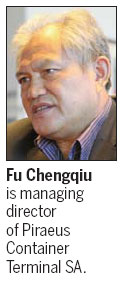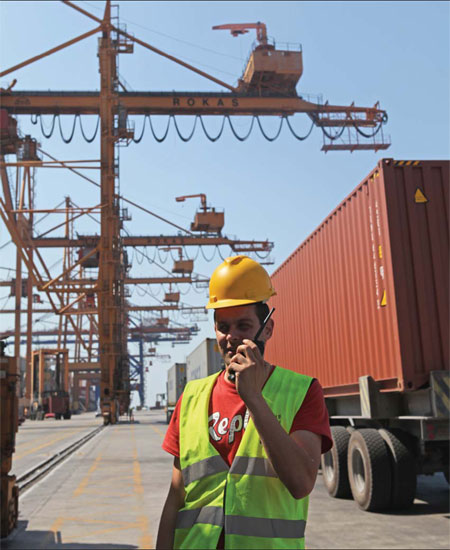Pier pressure pays off in spades

| A Greek dock worker at Cosco's port in Piraeus. Fu Jing / China Daily |
 |
Subsidiary of CHINESE shipping giant revives fortunes of struggling greek port
In debt-ridden Greece, where mere survival is a daunting challenge for most businesses, a Chinese company offers a rare example of a success story.
A subsidiary of the shipping giant China Ocean Shipping (Group) Co, also known as Cosco, has leased part of the Port of Piraeus, and is among a small batch of businesses whose performance figures make impressive reading.
About half an hour's drive from downtown Athens, the container terminals of Piraeus are busier than ever, with giant cranes and tractors constantly on the move and dockers working around the clock.
At his office in the port, Fu Chengqiu, managing director of Piraeus Container Terminal SA, a unit of Cosco Pacific Ltd, says his company has made a "record-breaking" success of its operations, despite the European economic crisis.
"We have not only survived but also broken records in handling containers," Fu says. "But these are absolutely hard won."
In June 2010, after winning the contract against stiff global competition, Cosco began operating Piraeus' No 2 pier and rebuilding No 3 pier. It signed a 35-year lease and pays 100 million euros to the Greek government annually.
At the time, the global economy had been in recession due to financial crises emanating from the United States, and the European sovereign debt turmoil was just beginning in Greece. But after two years of operation, figures from Cosco's running of Piraeus seem to show a major turnaround in performance.
Piraeus' total handling peaked at 1.5 million TEUs (twenty-foot equivalent unit measure for a standard-size container) in 2006, but the financial and debt crisis dragged that down to 450,000 TEUs in 2009.
In its first seven months of operations to the end of June, Cosco handled 680,000 TEUs. At No 1 pier, which is still run by the Greek authorities, 220,000 TEUs were recorded for the same period.
Fu, who was a cargo ship captain before he took over the helm of Cosco's subsidiary in Italy, is proud of his company's first years in Piraeus. But although it took just four months to record a profit at a port with a history of losing money, Fu says the challenges were tremendous.
Shortly after his company took over operations, Greek port workers went on strike. A 5-kilometer-long line of container trucks waiting to enter the port built up, along with angry complaints from their drivers sweltering under the summer sun.
Ship owners also complained when their vessels were delayed at the port after data for many containers went missing.
"The most important thing was to start to work," Fu recalls. He braved negotiations with truck drivers and port workers, promising to settle problems soon.
Fu's management team, with seven Chinese members, closely cooperated with the management from the Greek side, and with a pay rise agreed, the port workers returned to work. Fu also asked for container data to be properly computerized.
"At the very beginning, we spent several sleepless nights tackling the challenges," Fu says.
At first, Greek workers feared Cosco would replace some of them with experienced Chinese workers, but only seven Chinese have been employed at the port, and Cosco's presence has created about 1,000 jobs for Greeks.
"Instead of bringing Chinese workers, we have brought China's high efficiency to this port," Fu says.
Last year Cosco's No 2 pier handled 1.18 million TEUs and with the No 1 pier handled 500,000 TEUs.
"In total last year, we broke the record set in 2006," Fu says.
In the first five months of this year, Fu says, his pier has already handled 870,000 TEUs, and overall, the port is expected to handle 2.1 million TEUs.
"Though the crisis and uncertainties are still unfolding, we think this is a realistic target for us," Fu says.
But the situation for the international shipping industry in general remains bleak. At most ports in Europe the workload has decreased since 2008.
Despite Greece's crisis being the deepest, Fu says he still considers Piraeus a vital gateway for shipping heading to Europe.
"The port's geographic advantages and the quality services offered by us have helped deliver rapid progress at a time of crisis," he says.
His goal is to boost Piraeus' annual capacity to 3.7 million TEUs and transform the port into the main shipping hub of the Mediterranean, if not Europe.
Cosco is busy transforming No 3 pier into a deep-sea dock that will be able to take the world's largest cargo vessels with a maximum capacity of 18,000 TEUs.
"When this goal is reached," Fu says, "it can be the top port in Europe."
Further development
After two years of hard work, Fu says Cosco's success at the port has won the respect of the Greek government and the local workforce. Many Greek officials say Chinese investors are warmly welcomed and hope others will follow Cosco.
With a now established and increasing reputation, he says Cosco is in pole position to participate in any planned privatization of Greece's top 22 state-owned enterprises.
Fu says the company is in the middle of carrying out an in-depth feasibility study on becoming involved in various privatizations proposed by the Greek government.
The outcome of last month's election, with a new coalition government in place, may help Cosco in their decisions, he adds.
Greek authorities have expressed interest in further investment by Cosco and other Chinese companies in plans to privatize a variety of state-owned assets, believed to be worth around 50 billion euros.
Fu says Cosco had shown interest in building a logistics center, at an estimated cost of 280 million euros, being planned 30 km from Piraeus, but backed away for various reasons.
Another project attracting interest is the privatization of Piraeus Port Authority, which would provide further opportunities to become involved in cruise liner operations, ship maintenance, coastal real estate, port management and the port's No 1 pier.
Fu says Cosco officials have instructed him to carry out a feasibility study into financing various projects believed to be worth about 300 million euros.
Apart from further investment, Fu says his company has also been working on various financial plans in the event of the Greece quitting the eurozone. "We have completed several packages of solutions, which prepares us for the worst situation," he says.
Due to his successes overseas, Fu is often invited to speak to company executives in China to pass on advice and share lessons learned.
He says there are four elements ensuring him continued success.
First, safety is "an absolute priority" for port managers.
Second, workers must work swiftly to meet the vessel's schedule. Fu says his port will be among the most efficient in Europe after he trained Greek workers based on "Chinese speed and experience".
Third, the cost of loading and unloading containers needs to be kept at a reasonable level.
And finally, services and communication with ship owners must be timely and friendly. "If you can do well in these four areas, the customers will come to you," Fu says.
China has been encouraging its companies to invest overseas, but Fu warns: "This should be done in a cautious manner." He suggests that Chinese investors should invest in their own sector where they have had previous experience. "Only this way is there a chance of earning money."
Tan Xuan contributed to this story.
fujing@chinadaily.com.cn
(China Daily 07/06/2012 page19)
Today's Top News
- Xi calls for promoting volunteer spirit to serve national rejuvenation
- Xi chairs CPC meeting to review report on central discipline inspection
- Reunification will only make Taiwan better
- Outline of Xi's thought on strengthening military published
- Targeted action plan to unleash consumption momentum
- Separatist plans of Lai slammed































